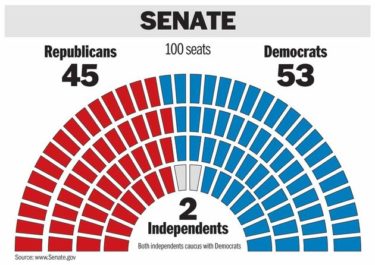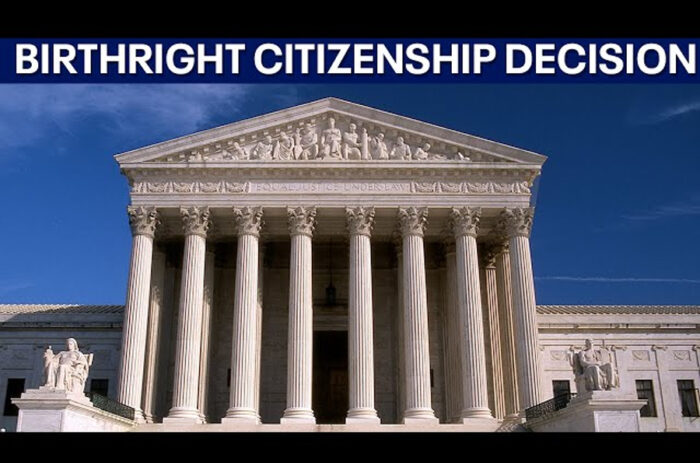redo Jump to...
print Print...
Visit the StudentNewsDaily “Election” page for information and resources about this year’s midterm elections.
(from Rasmussen Reports) – Over one-third of Likely U.S. Voters remain unaware which political party controls the House of Representatives and which has a majority in the Senate – less than two months before an election that may put one party in charge of both.
A new Rasmussen Reports national telephone survey finds that only 63% are aware that Republicans have majority control of the House. An identical number (63%) know that Democrats run the Senate.
Twenty percent (20%) mistakenly believe Democrats control the House, while 17% are not sure. Similarly, 18% think the GOP is in charge in the Senate, but 19% are not sure. (To see survey question wording, click here.)
This is even less awareness than voters expressed in March of last year. Remember, too, that these are respondents who are the likeliest to vote this November and so presumably are more politically aware than most other Americans.
 Women and those under 40 are less aware of who’s in charge of both congressional chambers than men and older voters are. Republicans are more aware than Democrats and unaffiliated voters, but a sizable number of GOP voters don’t know which party controls which house of Congress.
Women and those under 40 are less aware of who’s in charge of both congressional chambers than men and older voters are. Republicans are more aware than Democrats and unaffiliated voters, but a sizable number of GOP voters don’t know which party controls which house of Congress.
Even though not a single Republican member of either the House or Senate voted for the new national health care law [Obamacare], 31% of likely voters say they are not sure how their representative in Congress voted on Obamacare, an issue at the forefront of this election cycle.
Ninety percent (90%) believe voters in countries with democratically elected governments have a responsibility to be informed about major policy issues, but just nine percent (9%) think most Americans are informed voters.
Thirty-three percent (33%) of voters think it is better for the country when one political party controls both the House and Senate. Forty-four percent (44%) disagree and say it’s better when a different party is in charge of each chamber. That’s up slightly from 39% in December. Twenty-three percent (23%) are undecided. …
 Just six percent (6%) think Congress is doing a good or excellent job, while 65% rate its performance as poor. The number giving Congress good or excellent marks has been in single digits most months since April 2011.
Just six percent (6%) think Congress is doing a good or excellent job, while 65% rate its performance as poor. The number giving Congress good or excellent marks has been in single digits most months since April 2011.
Basically unchanged from December are the 16% of voters who think the House is doing a good or excellent job and the 13% who say the same of the Senate. Fifty-five percent (55%) believe the House is doing a poor job, while just as many (54%) rate the Senate’s performance as poor.
Fifty-eight percent (58%) of both Democrats and voters not affiliated with either of the major parties feel the GOP-controlled House is doing a poor job, but just 46% of Republicans agree. Only 38% of Democrats believe the Democratic-run Senate is performing poorly, but that compares to 64% of Republicans and 61% of unafifliateds.
Republicans are almost evenly divided over whether it’s better to have one party in charge of the entire Congress or have each chamber controlled by a different party. Democrats and unaffiliated voters tend to think divided control is better.
Most Republican voters think their representatives in Congress have lost touch with the party’s base over the last several years, while most Democrats believe their Congress members have done a good job representing what their party stands for.
Voters who are aware which party controls which congressional chamber are more critical of the job they’re doing than those who don’t know who’s in charge.
Among all voters nationwide, only 25% think their own member of Congress deserves reelection….
Twenty percent (20%) say they don’t know enough about Senate Majority Leader Harry Reid to offer any opinion of him, and 27% say the same of Senate Republican leader Mitch McConnell. Both men have been senators since the mid-1980s and have led their respective parties in the Senate for over seven years. House Speaker John Boehner and House Democratic Leader Nancy Pelosi, on the other hand, are both well known and highly disliked. …
The survey of 1,000 Likely Voters was conducted on September 9-10, 2014 by Rasmussen Reports.
Reprinted here for educational purposes only. May not be reproduced on other websites without permission from Rasmussen Reports. Visit rasmussenreports.com for the original article.
Visit the StudentNewsDaily “Election” page for information and resources about this year’s midterm elections.
Questions
1. a) Which political party controls the Senate?
b) Which political party controls the House of Representatives?
c) How many Democrats/Republicans are in each house? (see https://www.studentnewsdaily.com/election-resources-for-teachers/ for the answers)
2. Name the Democratic and Republican leaders of the Senate and the House.
3. What percentage of likely voters polled by Rasmussen know which parties control the House and Senate?
4. a) Which groups of those polled are less aware of who is in charge of both houses of Congress?
b) Why do you think this is so for each of these two groups?
5. a) What percentage of those polled knew how their representative in Congress voted on Obamacare?
b) Why is it important for a voter to know this?
6. a) Voters from which party are more critical of their party’s members of Congress?
b) Why do you think this is so?
7. On what qualifications do you think the majority of voters base their choice?
8. Which statistic surprises you the most? Explain your answer.
Background
How voters should decide which candidate to vote for:
Candidates can be judged in two ways: the positions they take on issues and the leadership qualities and experience they would bring to office. Both are important. Your first step in picking a candidate is to decide the issues you care about and the qualities you want in a leader.
When you consider issues, think about community or national problems that you want people in government to address. For example, you may be interested in the threat of nuclear war, government funding for student loans or teenage unemployment. Those are issues.
When you consider leadership qualities, think about the characteristics you want in an effective leader. Do you look for intelligence, honesty, an ability to communicate? (from smartvoter)
Determine the following on the candidates:
- How they stand on the issues
- How they voted on specific laws (or how they say they would vote)
- What they say
- What they actually do
- What others say about them
(for a general description of issues, go to: studentnewsdaily.com/conservative-vs-liberal-beliefs)
Resources
For a list of questions asked by Rasmussen in the survey, go to: rasmussenreports.com
Visit the StudentNewsDaily “Election” page for information and resources about this year’s midterm elections.
Daily “Answers” emails are provided for Daily News Articles, Tuesday’s World Events and Friday’s News Quiz.



